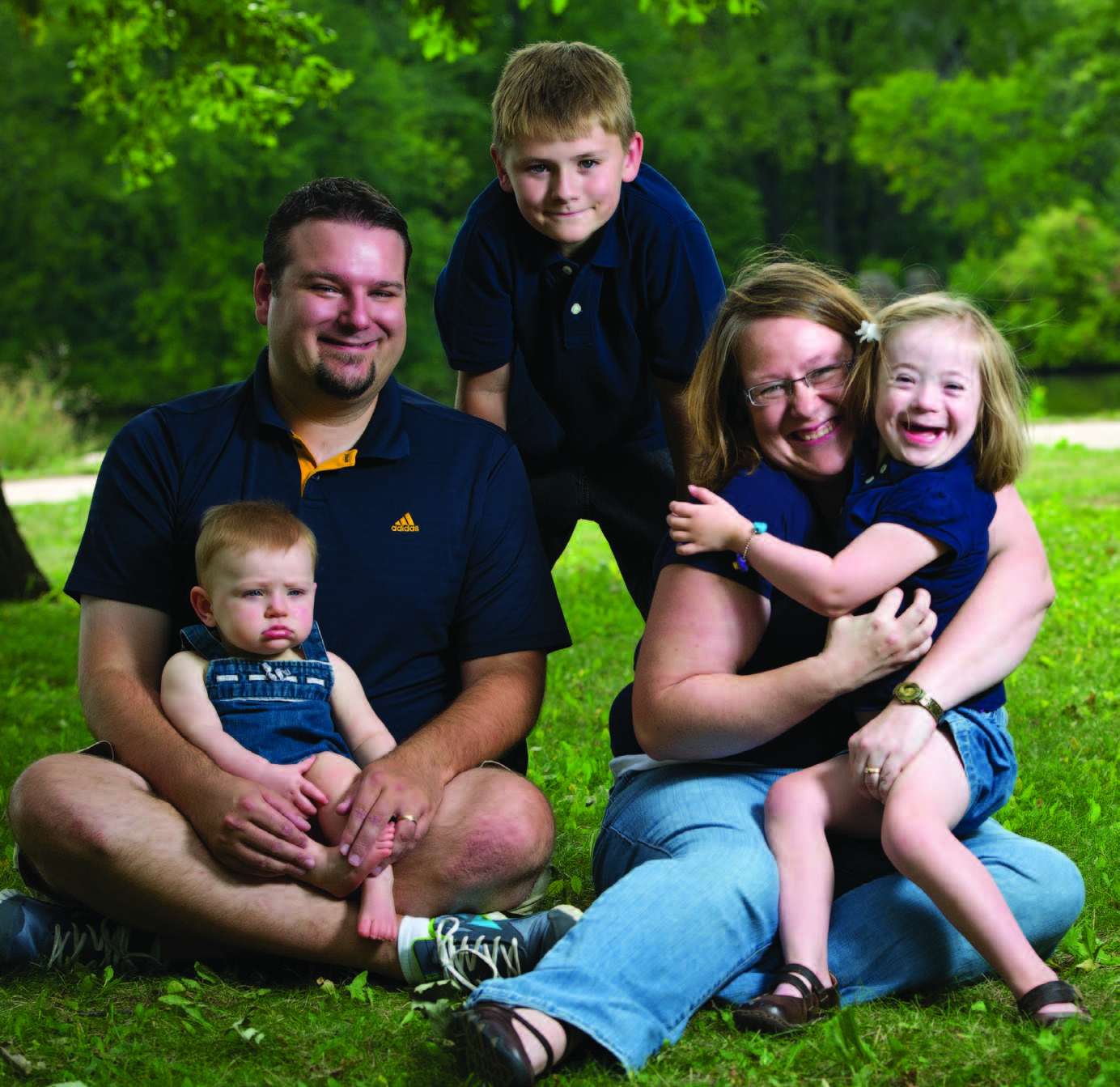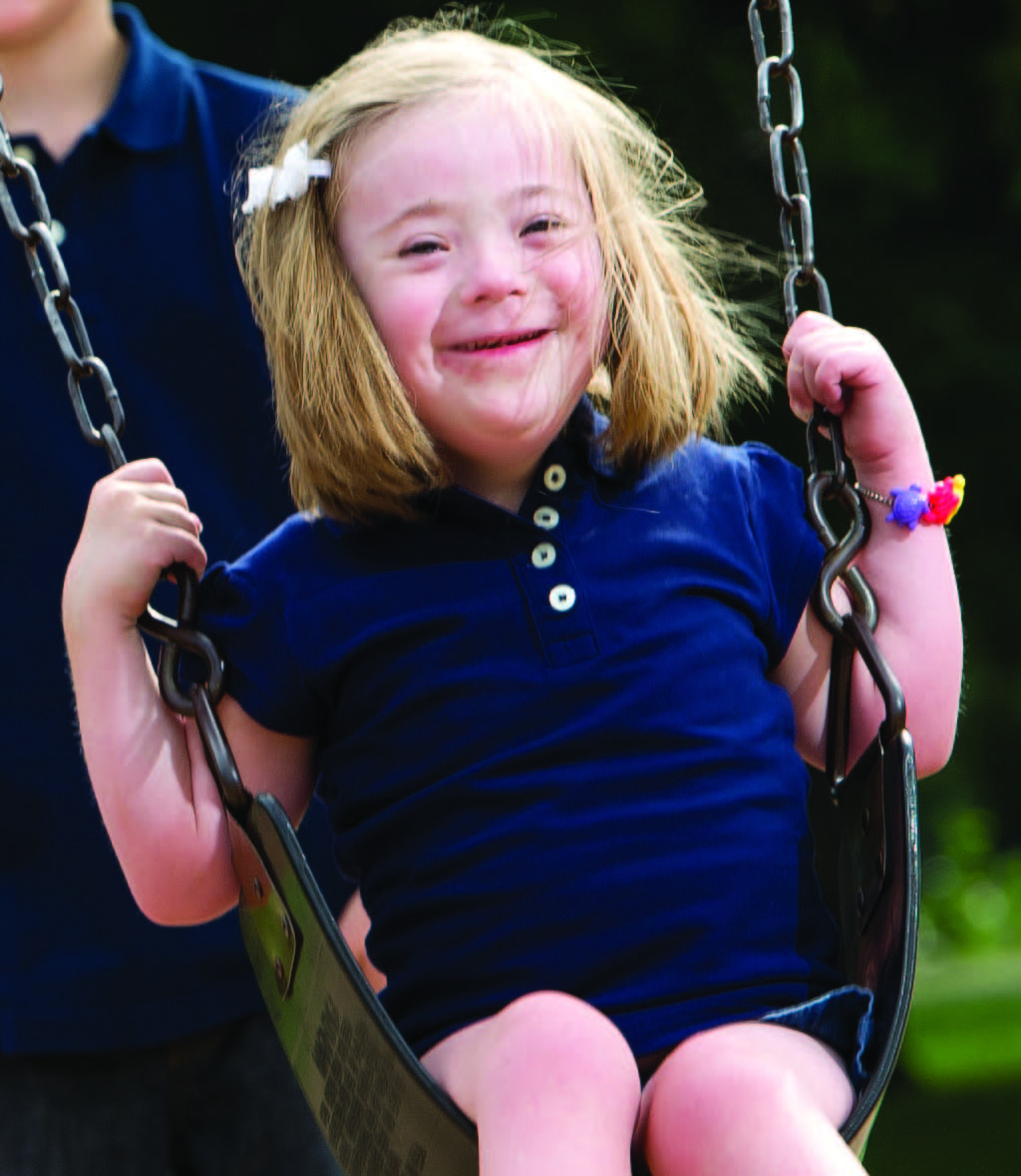Michelle and Matthew Odland of Wausau have taken full advantage of Marshfield Clinic's expertise in pediatric care.
 Michelle and Matthew Odland family, Wausau
Michelle and Matthew Odland family, Wausau Their second child, Nyssa, was born with Down syndrome and congenital heart disease, and later developed asthma and hypothyroidism. She underwent heart surgery at six months of age. Three months later, her older brother Nathan, 5, was diagnosed with diabetes.
Having one child with Down syndrome or diabetes is difficult enough. To have them both in one household is an exceptional challenge.
"Of course I went through grief," said Michelle Odland, who is a day care teacher. "You have to just move on and love each one as much as the other. We feel blessed that both of our children were treatable. And I think it does make you stronger as a family. You don't take anything for granted."
The Odlands were helped along this difficult path by
Melissa Hessel, M.D., a pediatrician at Marshfield Clinic Weston Center. "We absolutely love Dr. Hessel. It's very comforting to know we have a knowledgeable doctor who is also quite personable. She's always excited to see the kids," Odland said. As the children's primary provider, Dr. Hessel holds the key to the Clinic's pediatric expertise.
Journey
The journey began with Nyssa's birth, when her Down syndrome was noted for the first time. The child had a heart murmur and was transferred to the Neonatal Intensive Care Unit at Ministry Saint Joseph's Hospital in Marshfield. Testing revealed that Nyssa had two defects in her heart and coronary arteries that needed to be surgically corrected.
Nyssa's surgery was performed in Marshfield by a pediatric heart surgery team from Children's Hospital of Wisconsin in Milwaukee. Marshfield Clinic and Ministry Saint Joseph's Hospital contract with the Milwaukee facility for this service because there are not enough pediatric heart surgery patients to support this specialty in Marshfield. Adults are much more likely to have the same health problems, which is why most communities don't have pediatric specialists.
"Marshfield Clinic is the only place in northern Wisconsin that has almost every type of specialty physician a child could need, so they can be cared for closer to home," said
Julie Dietz, M.D., Nyssa's pediatric cardiologist. "Otherwise, people would have to travel to major cities to get this level of care."
Otolaryngologist
Gwen Stone, M.D., saw Nyssa for recurring infections and problems with her nose and sinuses. "I took her adenoids out, cleaned out her ears and placed incisions in her ear drums to drain fluid from behind the ear drum." While tiny ear canals are common in people with Down syndrome, Nyssa's were so little that Dr. Stone could not get tubes in them to provide drainage.
Meanwhile, Nathan Odland was diagnosed with type 1 diabetes by Dr. Hessel, who immediately called Pediatric Endocrinology in Marshfield. That same day, Nathan's parents drove him to Marshfield to see
Laurie Meyer, a nurse practitioner, to go over educational materials. "We just can't wait on this," she told the Odlands, who were still coming to grips with Nyssa's health problems. Shortly after his diagnosis, Nathan met with
Ivan Zador, M.D., a pediatric endocrinologist.
"Five years old is not unusually young for type 1 diabetes. To take care of it is not easy. It affects the whole family," Dr. Zador said. "The parents must give insulin injections and must check blood sugars at least four times per day. We ask them to write these numbers down and print them out once per week so we can make adjustments to the insulin dose. They also must count carbohydrates in breads, cereals and pastas."
Important
 Nyssa Odland, Wausau
Nyssa Odland, Wausau He said it's important for young patients like Nathan to be seen by a specialist, who in addition to fellowship training sees such cases regularly and keeps up with all research.
Primary care physicians may find it more difficult to adjust insulin doses because they do not see diabetes as often. If diabetes is poorly managed, it can cause lack of energy and poor growth. Hospitalization may be needed for acute worsening in diabetes control.
"Diabetes can also lead to significant long-term complications involving the kidneys, eyes, peripheral nerves and cardiovascular system. On the positive side, if diabetes is well managed, the likelihood of these chronic complications is quite low," Dr. Zador said.
"We see these patients every three to four months," he said. "We have longer visits because we go over their blood sugars, doses of insulin, diet and other topics." In addition to the doctor, patients are seen each time by a nurse and at least twice a year by a dietitian. He emphasizes that children should think of themselves as "healthy individuals with a condition that can be successfully managed."
Dennis Anderson, M.D., a pediatric ophthalmologist, saw both of the Odland children for preventive care. Nyssa, because of her Down syndrome, is prone to vision problems but so far is doing fine. Nathan's diabetes makes him vulnerable to eye problems that include diabetic retinopathy, but he too is doing fine.
"Most ophthalmologists who are not pediatric specialists would not be comfortable seeing children with Down syndrome or diabetes," Dr. Anderson said. "It takes someone who is interested in pediatrics and this kind of problem to spend the extra time to do these exams. That's why the system of care is so important. Together, we facilitate their care."
In fact, Drs. Anderson, Zador and Dietz all make regular outreach visits to Wausau, among other locations. The pediatric specialists are located near each other and consult regularly in person, and they take full advantage of the Clinic's sophisticated electronic medical record. They also share a special interest in children.
"Pediatricians choose to be pediatric specialists to take care of kids who have special needs," said Dr. Dietz, who has four children of her own. "One of the reasons people remember us years later is because we really do care about their children. I love them all, and I think they all are special.
"And part of my job is making sure the family is treated like they are part of the team. It's important to take care of them too, because they're scared," she said.
